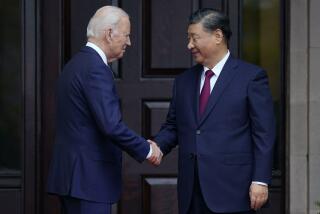Clinton Drops By to Meet Dalai Lama
- Share via
WASHINGTON — President Clinton, sensitive to a barrage of concerns over U.S. policy toward China, took his second symbolic swipe at Beijing in less than a week Wednesday, meeting with the Dalai Lama of Tibet despite Chinese protests.
The president’s “drop-by” meeting with the Tibetan leader-in-exile came amid reports that China had illegally diverted U.S. machinery to a military aerospace factory and amid ongoing concerns that leaders in Beijing sought to influence the White House through illegal campaign donations.
“In the last six weeks, the whole China policy issue has achieved a level of hysteria in the American media,” said David Shambaugh, director of the Sigur Center at George Washington University’s School of International Relations in Washington. “It’s across the political spectrum, left to right.”
But some experts said they doubt that Clinton’s bid to demonstrate distance from the government of China will persuade those who view U.S. policy toward Beijing as overly compliant.
Congressional opposition is growing toward renewing China’s most-favored-nation trade status. The White House wants to preserve that status, even as the administration is expressing concerns over China’s human rights record.
“The administration is running scared,” said Warren I. Cohen, a China expert at the Woodrow Wilson International Center for Scholars in Washington.
He added that allegations of Democratic Party donations originating in Beijing suggest to some observers that U.S. foreign policy toward China has gone awry.
“What you’ve got is a whole series of things that suggests the administration policy toward China has been influenced by fund-raising and corporate lobbying in ways that are antithetical to the public interest,” Cohen said.
It is against this background that Clinton gave a 25-minute audience last Friday to Martin Lee, a democratic activist from Hong Kong who has voiced concerns about the future of the British territory after Beijing takes control on July 1.
And on Wednesday, despite “resolute” Chinese objections, the president joined a session between Vice President Al Gore and the Dalai Lama, Tibet’s spiritual leader and Nobel laureate who seeks self-government for his homeland.
During the meeting, which lasted about 10 minutes, Clinton said he is willing “to suggest to the People’s Republic of China that they enter into a dialogue with the Dalai Lama or the Dalai Lama’s representative,” White House Press Secretary Mike McCurry said.
He added that Clinton plans to raise the issue with Chinese President Jiang Zemin when the two leaders meet this fall.
Chinese troops seized Tibet in the early 1950s. The Dalai Lama fled to India in 1959 after a failed revolt against Chinese rule and has since lived in exile.
The volatile nature of U.S.-China policy was apparent immediately after the presidential meeting.
Critics slammed Clinton for not receiving the Dalai Lama in the Oval Office, choosing the less official “drop-by” approach, which he also employed for a 1995 visit with the Dalai Lama.
“Why is it that the president has an open-door policy for Chinese arms dealers but the Dalai Lama must be slipped through the White House back door?” complained Sen. John Ashcroft (R-Mo.), referring to revelations that Wang Jun, a Chinese arms executive, attended a White House reception in February 1996.
Ashcroft also slipped in a gibe at Gore, who was blasted by conservatives for not making human rights a more prominent issue during the vice president’s recent visit to China: “We should embrace the people of China who yearn to breathe free, not toast the tyrants who ordered tanks in Tiananmen Square.”
Despite such criticisms, administration officials maintain that the most effective way to influence Chinese behavior is to build economic and political links to Beijing rather than to browbeat its leaders in public. Clinton plans to meet next week with Chinese Foreign Minister Qian Qichen.
In addition, the White House wants to renew China’s most-favored-nation trading status, a controversial decision that must be made by June 3.
The issue comes up annually, although some officials had hoped until recently that it could be extended to China on a permanent basis.
The reasons for opposing the trading status this year include allegations of a pattern of religious persecution and human rights abuses, concerns about Chinese ambitions in Asia and other perceived transgressions.
More to Read
Sign up for Essential California
The most important California stories and recommendations in your inbox every morning.
You may occasionally receive promotional content from the Los Angeles Times.










